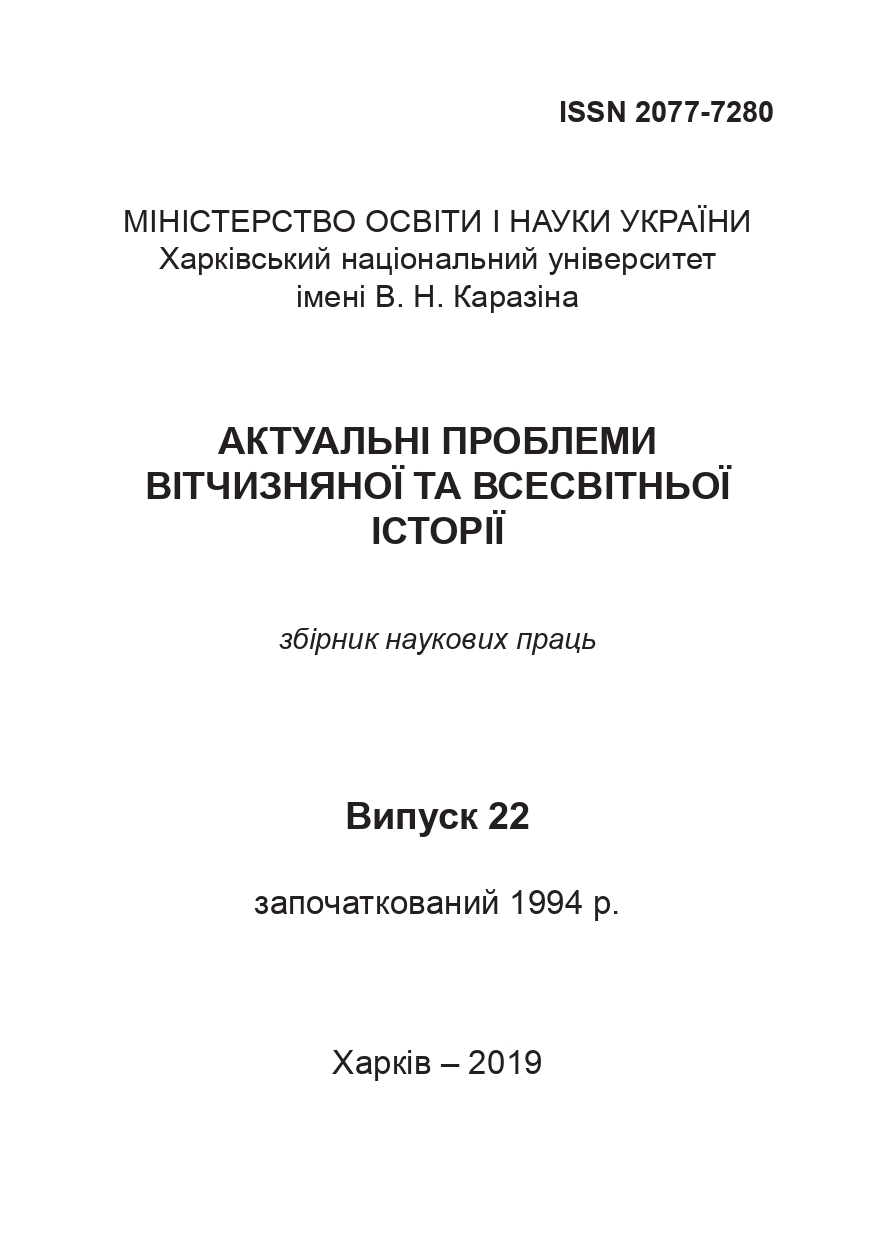«Democratic transition of Bulgaria in historiography»
Abstract
The article deals with works devoted to various aspects of Bulgaria’s European integration in the context of democratic transition. The goal of the article is the classification the historiographic array and identification the main features inherent in various groups of publications. The works differ not only in the profile of the authors, but also in the research methods used. Due to these circumstances, each historiography group focuses on certain aspects of transit, which ultimately allows a researcher to form an integral picture of this process. Author considers the problem in accordance with the regional geographic principle and divides historiography into 4 groups: Western, Bulgarian, Ukrainian and Russian. Within the national–state framework, scientific works are considered in chronological and problematic aspects. The article concludes that Western scholars generally view Bulgaria in the general context of the region’s democratic transit. Bulgarian authors focus on governance and reform coordination, as they have the opportunity to observe the process from the inside. Ukrainian authors adhere to Euro-optimistic rhetoric. In addition to the methodological features of the presentation of the material, some authors (especially russian) are influenсed by the ideology of residence country. Therefore, in Russian historiography, authors often focus on the negative aspects of democratic transit.
Downloads
References
Алексеев В. Вхождение Болгарии в Европейский союз: основные аспекты внутренней и внешней политики: дисс. … канд. ист. наук. Краснодар, 2009.
Баева И. Две десетелетия български преход – предпоставки, проблеми, равносметка // Дриновский збірник. 2011. С. 330–341.
Баторшина И. Основные этапы восточноевропейского расширения ЕС // Ретроспектива. Всемирная история глазами молодых исследователей. 2009. № 4. С. 81–91.
Бурдяк В. Політика постсоціалістичних України і Болгарії в руслі європейської інтеграції та системи безпеки // Дриновський збірник. 2011. С. 385–398.
Валева Е. Системная трансформация в Болгарии: от смены власти до вступления в Европейский Союз (1991–2007) // Общественные трансформации в странах Центральной и Юго-Восточной Европы (90-е годы ХХ века – начало ХХI столетия) / под ред. Ю. С. Новопашина. М., 2008. С. 22–85.
Валева Е. Постсоциалистическая Болгария: надежды и разочарования. М., 2011. С. 18–29.
Вахудова А. Нерозділена Європа. Демократія, важелі впливу та інтеграція після комунізму / пер. з англійської Т. Цимбал. Київ, 2009.
Генова-Михалева В. Система образования в Болгарии в условиях европейской интеграции: организационно–управленческие аспекты: дисс. … канд. эконом. наук. М., 2005.
Георгиева Е. Трансформация медиа Болгарии в условиях европейской интеграции: дисс. … канд. полит. наук. СПб., 2011.
Давыдова Н. Общественно-политическое развитие Болгарии в контексте международных отношений: дисс. … канд. ист. наук. М., 2007.
Зудинов Ю., Валева Е. Болгария в середине 90-х годов: по-прежнему на перепутье // Политический ландшафт стран Восточной Европы середины 90-х годов / отв. ред. Ю. С. Новопашин. М., 1995. С. 13–39.
Зудинов Ю. Болгария: политические метаморфозы первого пост-тоталитарного пятилетия // Политический ландшафт стран Восточной Европы середины 90-х годов / отв. ред. Ю. Ф. Зудинов. М., 1997. С. 12–54.
Калинова Е., Баева, И. Българските преходи 1939–2010. София, 2006.
Милова М. И. Болгария – ЕС: ожидания и результаты присоединения // Дриновський збірник. Харків-Софія, 2011. С. 379–384.
Панушев Е. Външноикономическата ориентация на България в условията на членство в Европейския сїюз и участие в глобалните стойностни вериги // Списание на Българската академия на науките. 2017. № 3. С. 59–65.
Тодоров І. Євроатлантична інтеграція Болгарії як складова модернізаційних процесів // Дриновський збірник. Харків–Софія. Т. 4. 2011. С. 373–378.
Романюк О. Посткомуністичні трансформації Болгарії та України: компаративний аналіз // Дриновський збірник. Харків–Софія Т. 4. 2011. С. 362–373.
Хубенова–Делисивкова Т. Финансовата интеграция на България в ЕС: проблеми и перспективи за участието в Икономически и паричен съюз // Cписание на Българската академия на науките. 2017. № 3. С. 42–50.
Ченчик Д. Интеграція Болгарії до євроатлантичних структур: погляд з Брюселя та країн-учасниць ЄС // Дриновський збірник. Софія. Т. 9. Харків–Софія. 2017. С. 32–337.
Bachev H. Sustainability of Bulgarian farming enterprises during European Union common agricultural policy implementation // Journal of Applied Economic Sciences. 2017. № 2. Р. 422–451.
Bitzenis A., Marangos J. The role of a risk as an FDI barrier to entry during transition: the case of Bulgaria // Journal of economic issues. 2008. № 2. P. 499–508.
Chiva C., Phinnemore D. The European Union’s 2007 Enlargement. Abingdon, 2012.
DeDominicis B. State authority in Bulgaria: a post-colonial Balkan national community // International Journal of Interdisciplinary Studies. 2015. № 1. Р. 21–37.
Felician Z., Doytch N. EU accession and foreign-owned firms in Bulgaria // Post-communist studies. 2017. № 4. P. 392–404.
Gateva E. Post-accession conditionality – translating benchmarks into political pressure? // East-European Politic. 2013. № 4. Р. 420–442.
Vodička K. Bulgaria // From Eastern Bloc to European Union: comparative processes of transformation since 1990 New York, 2017. P. 278–306.
Kalotay K. FDI in Bulgaria and Romania in the wake of EU accession / K. Kalotay // Journal of East-West Business. 2008. № 1. Р. 5–40.
Katsikas S., Siani-Davies P. Negotiating diplomacy in the New Europe. London, 2011.
Kostova D. Report on Bulgaria: Elites’ Europeanness and their trust in institutions // Historical Social Research. 2016. № 4. Р. 239–253.
Levitz P., Pop-Elches G. Why no backsliding? The European Union`s impact on democracy and governance before and after accession // Comparative Political Studies. 2009. № 4. Р. 457–485.
Levitz P., Pop-Elches G. Monitoring, Money, Migrants: Countering Post-Accession Backsliding in Bulgaria and Romania // Europe-Asia Studies. 2010. № 3. P. 461–479.
Nancheva N. Bulgaria’s response to refugee migration: institutionalizing the Boundary of Exclusion // Journal of Refugee Studies. 2016. № 4. Р. 549–567.
Papadimitriou D., Gateva E. Between Enlargement: Led Europeanisation and Balkan Exceptionalism: An Appraisal of Bulgaria`s and Romania`s into the EU // Perspectives on European Politics and Society. 2009. № 2. P. 152–166.
Petrevski G., Bogoev J., Tevdovski D. The transmission of foreign shocks to South- Eastern European economies // Empirica. 2015. № 4. P. 747–757.
Toneva-Metodieva L. Beyond the carrots and sticks paradigm: Rethinking the cooperation and verification mechanism experience of Bulgaria and Romania // European Politics and Society. 2014. № 4. Р. 534–551.
Weziak-Bilowolska D. Spatial variation in EU poverty with respect to health, education and living standards // Social Indicators Research. 2016. № 2. Р. 151–179.

